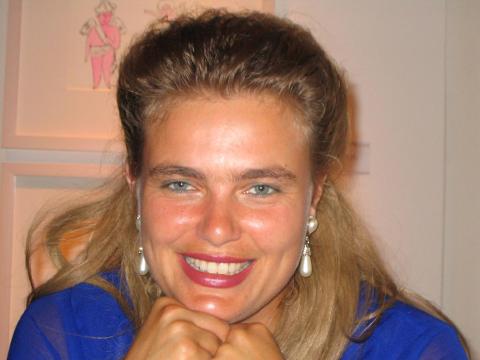|
<< -- 2 -- Tess Crebbin MOZART AND LEDERHOSEN

And for those who were in search of real operatic excellence, Elke Maria Slawitschek who has since long established herself as one of the finest singers in the region, did not fail to deliver at the capacity house where she impressed with her dramatic talents as well as her impeccable negotiation of even the most difficult and challenging coloraturas. Especially moving was her aria in the first act, preceded by a dramatic stage entrance, which she believes can be roughly translated into: 'I am the Queen here, has anyone got a problem with this?' To this Bavarian-born singer, the Queen of the Night is a 'tough girl' with a soft heart and this is what she brings across.
With her immense stage presence and excellent coloratura acrobatics, one can imagine her just as easily in the Met or Covent Garden as in Munich's Gasteig venue (which is also the home of the Munich Philharmonic) especially as the Queen of the Night that is one of her trademark roles and has thus far received rave reviews ever since she first took her interpretation of the tormented, and tormenting, Queen to the opera stage a couple of years ago. Slawitschek's Queen of the Night is overpowering and impressive but she is not the impersonation of vile evil that she is portrayed as in so many other productions. In the end there is room for redemption and also some sympathy for the Queen who seems to be caught up in her own authority. Astonishing is the confidence that Slawitschek brings to this difficult role where even widely famous singers have been known to meet their limits. She sings on the breath, with what appears to be a very individual technique that results in a powerful voice capable of negotiating the heights with crystal clear tones.
A Bavarian with typical Bavarian charm and friendliness off-stage, she enters fully into the role when in costume and transforms herself into an entirely different person who seems to consist only of voice and power. Which gets us on to the current question that seems to dominate the opera stages: does a truly powerful voice need a powerful body build? Deborah Voigt was on the receiving end of the stick recently when she was sacked for being too voluptuous in a world that demands slim opera singers, looking more like models than like the divas of the past. Yet after witnessing the powerful performance of Slawitschek in Munich one is left to wonder whether there is a point to be made for a strong body build. The woman has lungs, plenty of them, tucked inside a fine singer's chest capable of holding a sheer endless volume of air, which is precisely what the role requires. And she works hard for the strength that eventually transmits into her voice and overall performance. But how exactly does one get a voice that powerful?
'In my spare time, I do a lot of sports,' Slawitschek relates after the show. 'I don't think this is harmful for a singer -- in fact, it builds up your stamina and constitution. I am rarely ever ill because my body is so used to being out in the fresh air, which is good for the lungs. And I need good lungs to sing well. I also think that sport is very important to deal with the stress that comes from being an opera singer. You need something to balance that.'

Elke Maria Slawitschek. Photo © Anja Ullrich
|
The singer also says that she watches what she eats and relies mainly on a diet of fresh fruit and vegetables, low fat, and fresh juices every morning. The result is a healthy body that seemingly without effort brings forth a truly outstanding voice. That the Bavarian Country Theatre is able to bring a singer of this calibre to their production speaks for them and for the skill and reputation of its director and conductor, Rudolf Maier-Kleeblatt.
Continue >>
Copyright © 14 December 2004
Tess Crebbin, Germany

|

